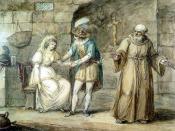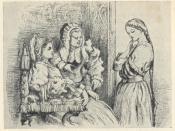There is a variety of dramatic effectiveness in Act 3 Scene 5 and there is a definite mixture of emotions. This ranges from love and desperation from Juliet to empathy and anxiety from the audience.
The first evidence of drama is in line twenty-four when Romeo says 'Come, death, and welcome! Juliet wills it so'. The dramatic effect of this is that it makes the audience feel deep empathy for them as Romeo is willing to risk his whole life for Juliet. This shows how much depth is in their love and their devotion to each other. 'Then, window, let day in, and let life out' shows Romeo is Juliet's life. This is tragic as when Romeo leaves, Juliet will feel as if she's dead. The audience feels empathy towards them because they are such a young couple and they have their whole lives to look ahead to, but as Romeo has been banished they have nothing to look forward to.
Banishment in those days was the worse thing that could happen to someone. This meant Romeo had to live outside the city walls of Verona and was declined access to priests, doctors, family or friends. He was also disadvantaged to visit the shops or his daily essentials. I think this deprivation would have made Romeo feel very isolated and alone, but I suppose this is better than being caught by Lady Capulet.
Romeo causes anxiety and tension from the audience when he lingers about and takes his time to leave from Juliet. In the duration between line one to fifty-nine, Romeo says his goodbyes. In line forty-nine Romeo says 'Farewell' but still stays around for some time! The dramatic effect of this is the audience is reassured that he doesn't want to leave Juliet and...


